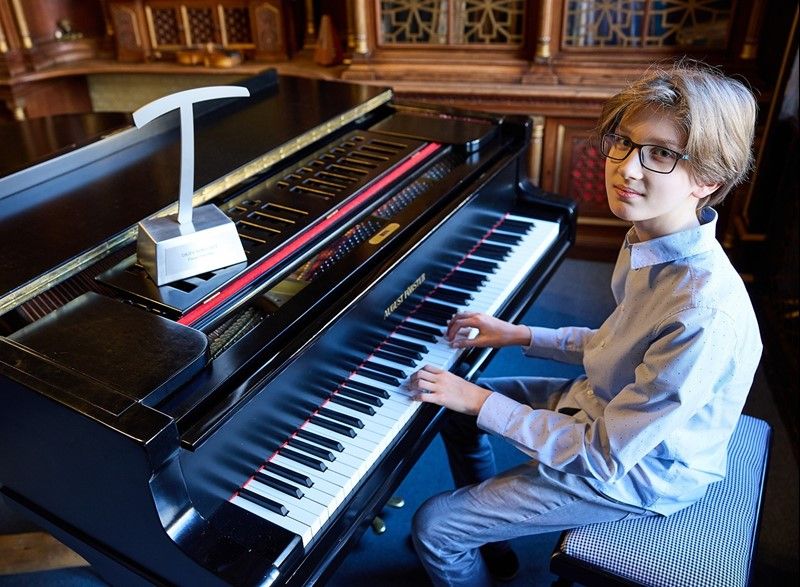He is only fifteen years old, but he is a talent from God. Pavel Pejchal from Trutnov, a student of the local gymnasium and elementary art school, where he goes to teacher Vít Havlíček to improve his piano playing, successfully passed the entrance exams and will enter the Prague Conservatory in September. He took advantage of his talent by winning a number of prizes at many competitions not only in the Czech Republic, but also abroad.
Among his highlights so far is the performance at the concert of the laureates of the International Viennese Spring Music Competition, which took place in 2021 in Vienna. In addition, he is the holder of the Trutnovinek Award – Discovery of the year 2021. “I would mainly like to devote myself to a solo piano career, to have concerts that people will go to. That’s my current idea,” said the young pianist from Trutnov.
You have successfully passed the admission procedure to the Prague Conservatory, where you will study in the piano department from September. How do you feel about it?
I’m definitely very excited that I made it. I originally applied to two schools – the Pardubice and Prague conservatories. In the end, I chose Prague because of its prestige and also because of the choice of teacher Adam Skoumal, with whom I went for consultations three months before the admission procedure.
What did you have to go through during admissions?
The exams consisted of two parts. The first one was talent and my playing, including the one from the sheet music without preparation and the music from the musical theater play Heaven on Earth, was evaluated by five judges, one of whom was professor Milan Langer, who heads the piano department at the conservatory. The second part of the exam was written.
Are you looking forward to boarding there? What do you expect from this school?
It will definitely be a big change compared to my current studies at the gymnasium. I am pleased that the school will be focused on one field – playing the piano. I also hope to have more time to exercise than before. I expect that the approach of the teachers will also be different from other schools. Of course, I believe that I will gain new experiences, the conservatory will provide me with further development in my playing and broaden my horizons.
How did your parents react to your admission to the conservatory?
My parents supported me in my decision to go to the conservatory and, like my sister and grandparents, they were happy that I got there. Besides, my mother told me that I will miss her at home, because now we are in daily contact and when I am at the conservatory, we will only see each other on weekends.
As far as I know, your mom plays the piano and your dad plays the guitar. Were they the ones who steered you towards a musical future?
They certainly contributed to this in a fundamental way, but the key figure who intensively guides me to play the piano is my teacher Vít Havlíček from the Trutnov Elementary Art School, where I attend. He contributed to the fact that my interest in playing the piano began to increase. My parents didn’t put any pressure on me and supported me in everything.
Do you remember the first time your fingers touched a keyboard?
I didn’t know until my mom told me. She showed me a photo of me as an eight-month-old baby sitting on her lap at the piano and playing, I don’t know what. It was such a funny situation. You could say that this was the origin of this interest of mine.
What did primary art school give you and what did it enrich your talent?
First of all, I was enriched by the already mentioned teacher Havlíček, who has been guiding me for the eighth year and I would like to thank him very much for that. I must also not forget the leadership of “Zuška”, which contributed a financial amount to me when I went to competitions. I actually had support from all sides at school.
Where did teacher Havlíček move you in eight years?
The teacher has a great shot at the goal, which many teachers do not have these days. He thoroughly prepared me in every way for all the competitions I participated in. The overall education he has given me in connection with playing the piano is priceless. I am grateful to him for what he taught me and that he was my teacher. At the same time, he also teaches at AMU, so he has enormous experience. I think we understand each other.
You are only fifteen years old, but you already have many successes behind you, including, for example, the highest awards at international competitions in Vienna, Budapest, Paris, Belgrade and Warsaw, which testify to an extraordinary talent. But how much effort does it take to achieve this?
It started when I first went to competitions in the Czech Republic, such as Prague Junior Note, Broumovská krysta, Beethovenovy Teplice and others. Then, during the covid quarantine, the teacher brought me to online competitions where we sent video clips of songs. In Austria I won two first prizes at two different competitions. As a bonus, the laureates’ concert in Vienna followed. It was certainly a great and unforgettable experience to play in this music-famous city.
Which concert abroad still sticks in your memory?
I think he wasabout performance at the competition in Dresden, Germany, where I met a lot of piano players from abroad in my category, which I find very beneficial and I have good memories of it.
Did the audience’s reactions differ in individual cities?
I don’t think it’s much different. People who like classical music and similar compositions go to concerts.
How much time do you spend playing the piano a day?
It depends on how much time I have, but it’s about three hours a day, including the same amount of hours at the elementary art school, where I go on Mondays and also rehearse there on other days.
At last year’s 42nd edition of the Trutnov Autumn, did you play compositions by famous authors in a completely packed hall of the Bohuslav Martinů Concert Hall in Trutnov and then witness a hearty standing ovation? What was it?
I did not know what to expect from the performance and for the first time I also played a piano concerto with the Trutnov Festival Orchestra. It’s a big difference compared to solo play. But the reaction from the audience was very nice, and that certainly made me happy.
Teacher Havlíček said that playing in front of a home audience is the most difficult, especially when it is a solo recital. Do you think so too, or do you not differentiate between domestic and foreign audiences?
I have rather the opposite opinion. The home audience does not particularly limit me and I take it as preparation for performances in larger halls.
Are you nervous before and during the performance?
I definitely suffer from nervousness, stress, tension before the concert, my hands are cold or sweaty. The audience knocks my self-confidence down a bit, but I already have experience that in the middle of playing the stage fright leaves me, I get fully involved in the music and the audience doesn’t hold me back in any way.
Do you have any rituals before you go on stage and sit down at the piano?
Before the concert, I try to think about something completely different, relax, de-react and get into a comfortable position, so that the concert will be according to my ideas.
What repertoire and composers are closest to you?
In music, I like the romantic period the most, specifically Frederic Chopin, which I play a lot. Once, the teacher assigned me a Chopin waltz and moll, which is such a basic composition. I started to like it and it was with his compositions that I performed at various competitions. Chopin opened my horizons to classical music. But I also like music composers Ferenc Liszt or Sergei Rachmaninov.
They say that you are not only gifted, but also diligent, goal-oriented, very spontaneous in music, and you have the desire to further your education. Where would you like to go in music?
For example, I don’t have the desire to perform in the world’s concert halls yet. It’s a nice idea, but it’s probably still a long way off. I would mainly like to devote myself to a solo piano career, to have concerts that people will go to. That’s my current idea.

Do you have a piano role model that you look up to?
Among my favorite pianists are the virtuoso Daniil Trifonov or Evgeny Kissin or Arthur Rubinstein. But I mostly follow Chopin performers and the music of the Romantic period.
What pianos do you play? Which one would you like to sit for?
We have a fairly old model piano at home that I practice on. But it’s not a minus, because then it’s better to play a better quality instrument. I like the Yamaha brand piano and also the world-famous Steinway piano, which is part of the Prague Conservatory, where I will join in September.
Do you focus only on classical music or do you occasionally delve into other genres of music?
I prefer classical music. But when I hear something that interests me, I’m happy to play it sometimes.
Do you have any other hobbies besides playing the piano, or does music keep you completely occupied?
Besides playing the piano itself, I listen to music, which is a big part of my life. Of course, I also see my friends and sometimes do sports.
Pavel Pejchal through the eyes of his teacher Vít Havlíček
Pavel Pejchal is an exceptionally gifted student. I had the opportunity to teach him from his beginnings, that is, from the age of seven. During that time he has developed to a very high level, far exceeding the normal average. His greatest strength is his spontaneous musicality. Thanks to this excellence, diligence and creativity, he won numerous awards at classic and online competitions in the Czech Republic and abroad. Despite many of these successes, Pavel is still modest.
There is always a very pleasant atmosphere in our classes and we have a lot of fun in addition to the music, because we understand each other very well on the human side as well. Having a talented student in the class is of course a joy. But it’s also a big responsibility that requires far more in-depth preparation for classes. Only preparations for piano competitions are time-consuming. But the result is worth it. From September, Pavel will study at the Prague Conservatory, where he successfully passed the talent test. I wish him to continue to develop his skills, to achieve further success and, above all, to enjoy music.
Hynek Šnajdar
[email protected]
Photo: Miloš Šálek
Tags: suffer stage fright middle playing leaves talented pianist
-







